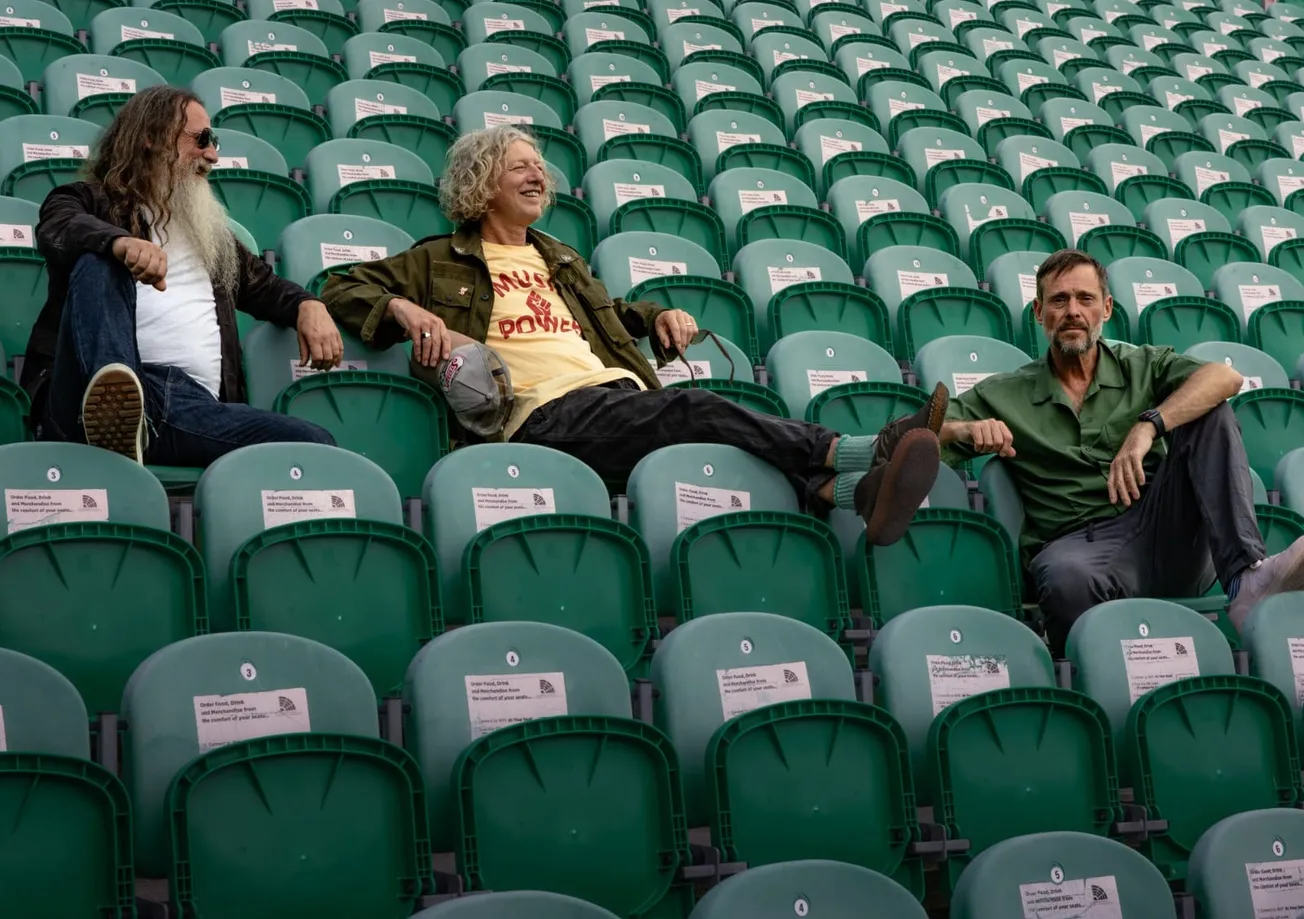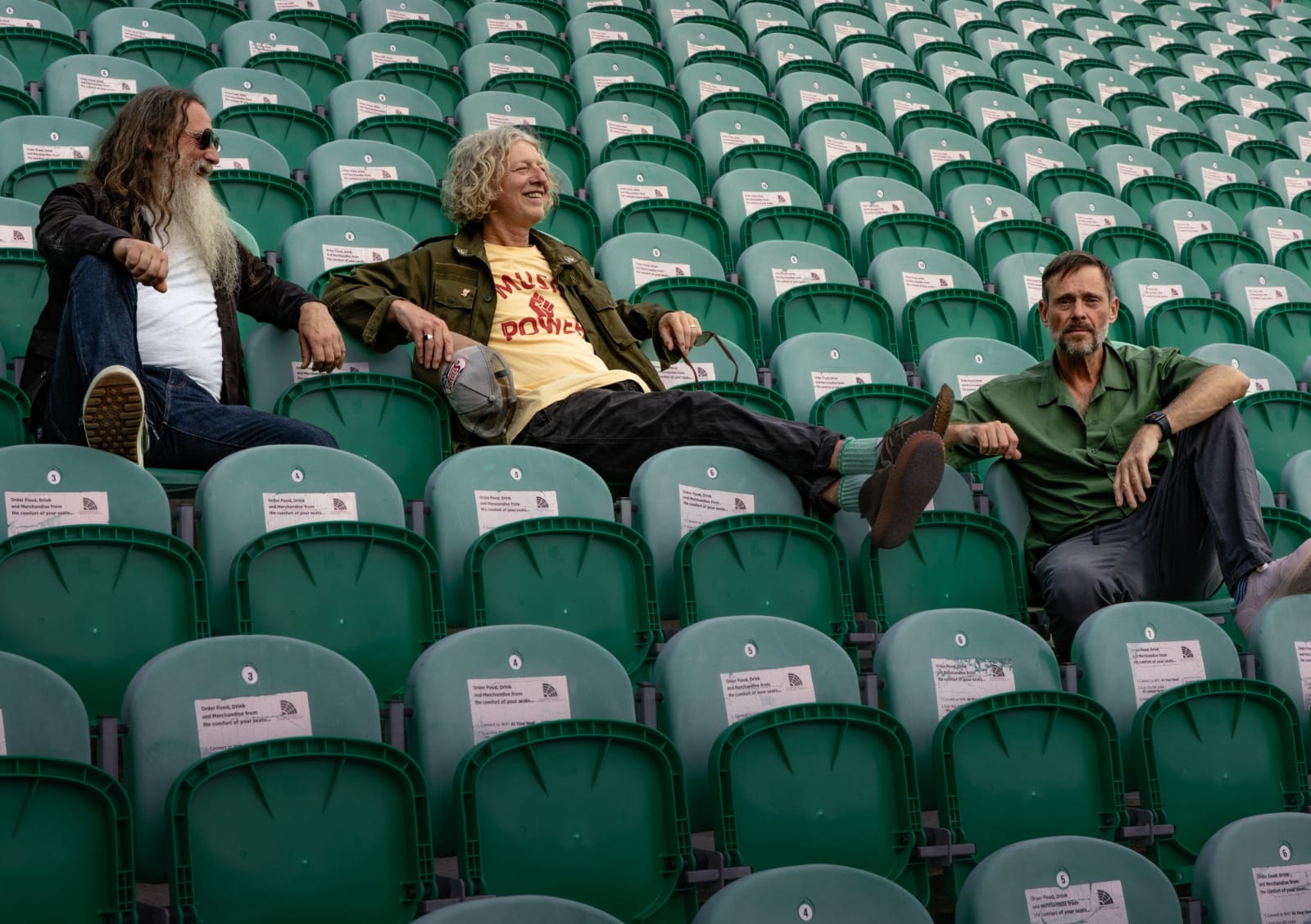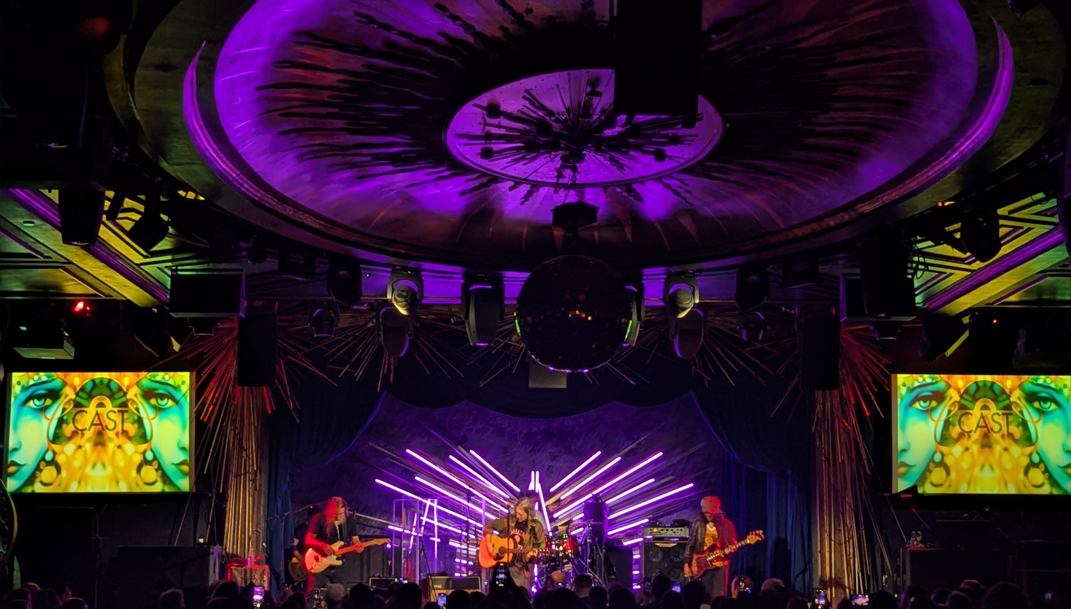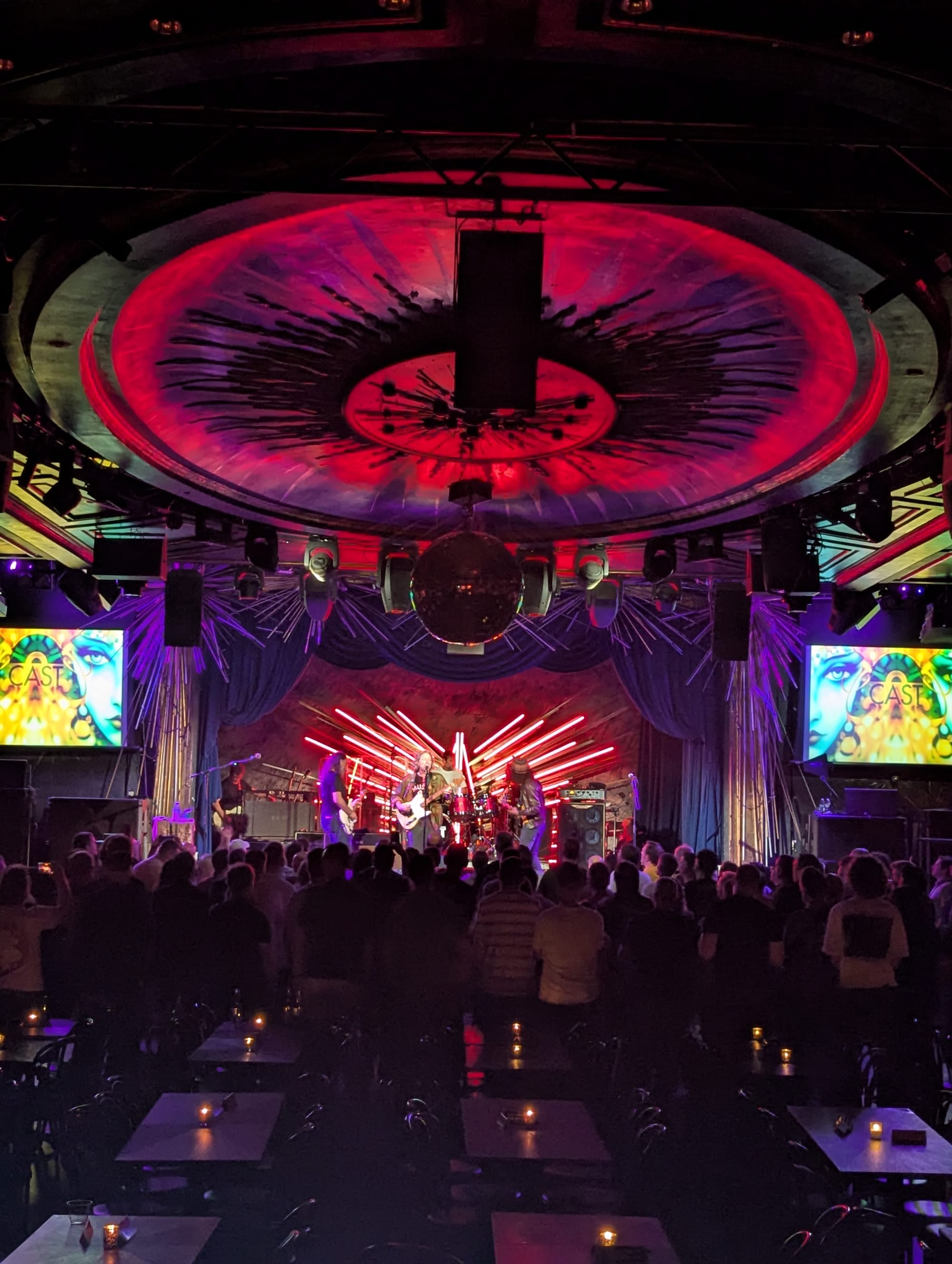Cast, the Scouse underdogs bringing guitar back

Fresh off supporting Oasis, the Britpop leg-ends hit the Olympia soon. Lucy Green catches them in New York
Welcome to The Post and this feature about Cast. We’re Liverpool's quality newspaper, delivered entirely by email. Sign up to our mailing list and get two totally free editions of The Post every week: a Monday briefing, full of everything you need to know about that’s going on in the city; and an in-depth weekend piece.
No ads, no gimmicks: just click the button below and get our unique brand of local journalism straight to your inbox.
The green room is thick with adrenaline. Crew pass in and out; someone is sent to retrieve a bucket hat from the stage. A positive debrief is in motion. Loose tobacco and empty water bottles are strewn across one battered sofa. Unwinding on the other are John Power and Keith O’Neill of Cast — the Scouse supergroup thousands of miles from home, who’ve just lit-up New York’s iconic Webster Hall.
The gig was a supporting set for the Brian Jonestown Massacre. Raucous, perhaps, but between opening for Oasis’ biggest show yet at LA’s 90,000 capacity Rose Bowl and the last few nights at Wembley, a relatively intimate break. Back in the day Webster Hall was the first modern nightclub, a Lower East Side hang-out and rally hall for anarchists, Bohemians and masquerade ballers; rocking this and the Rose Bowl is a testament to Cast’s sharklike adaptability.
If you don’t know Cast and you’re from Liverpool — Hell, even if you’re not — shame on you! OK, so they’ve never quite lived up to their “The Who of the 90s” tag. Sometimes they’re left out of the Britpop canon, or relegated to the minor arcana: more Kula Shaker or the Boo Radleys grade than Supergrass or Blur. There’s even a shout that they’re less famous now than their founders’ previous groups: their back catalogue can’t boast a playlist ubiquity like The La’s “There She Goes”, nor do they retain quite the slavish cult following of Shack, their co-founder and ex-bassist Pete Wilkinson’s band.
But there’s always been something different about them. Hit records like All Change — the fastest-selling debut in Polydor’s history at the time — proved that thirty years ago. Even now, cooling post-gig on a raggedy backstage couch, they shine.

Los Angeles was the tour highlight, they say. But then there was that Dublin afterparty. Some crew members are still recovering. Not the musicians, though — they’ve matured and mellowed from their 90s heyday. Keith is sober and enjoying the summer’s phenomenon. Beneath that rock and roll mist is a just grounded group of guys loving their work. The week before at Manhattan’s Sony Hall, I saw Cast play their first US headline gig in nearly 30 years. Despite the cosy, subterranean venue tucked beneath the frenzy of Broadway barely reaching its 1,000 capacity, the band had no problem getting the vibe going.
As the crowd shook at the barrier to both 90s hits and more recent tunes, it became clear this wasn’t just a band riding Oasis’ coattails. In fact, this year’s resurging interest in 90s British guitar bands — a Britpop Summer — is a shift that Cast felt well before the Gallaghers’ big announcement last year.
“We noticed a change in demographic,” John Power says back in the green room. “There was a new generation, a younger generation, itching to get involved. The Oasis thing completely confirmed that.”
This storm of cultural nostalgia brewed in magazine headlines and broke as intergenerational battles online. Who more deserved an Oasis ticket: long-suffering veteran fans, or youngsters who’d never got the chance to see them? Fury over astronomical ticket prices then undermined the working-class authenticity of the Mancunian mega-stars in the minds of many followers.
Meanwhile, Oasis’ smaller, largely underrated, support act was quietly reviving. Cast’s return is proof that the appetite for God’s-honest, grassroots guitar music runs deeper than a summer nostalgia trend.
In February 2024, Cast released Love is the Call. Until this point, it’d been a rocky few decades: they initially split in 2001 then performed a series of semi-committal reunions throughout the 2010s.
“The band wasn’t really vibing at the time,” Power explains. For a period, “we lost our way with ourselves.”
But against expectations, Love is the Call was the band’s most successful album this millennium, beginning their climb out of cult obscurity.
“It felt like a debut!” Power says. “It was the record that Cast needed to make, but hadn’t.” It was also the album Power was driven to make on the advice of Alan McGee — most famous for discovering Oasis in 1993.
Power had intimated the album could be Cast’s swansong. But mere months later, they were opening for Liam Gallagher on his 30 years of Definitely Maybe tour. That success secured the opening slot for Oasis’ mammoth reunion this summer. Cast headed back to the studio for some spontaneous recording and, in July, released the single “Poison Vine”. It garnered their first big radio play since 1999.
Love is the Call is a good album. It’s not quite the youthful burst of All Change, but there’s a depth and vitality to it for sure. With Power back on bass for the first time since The La’s, he thinks it’s the best the band has played. He says that’s mainly down to maturity and focus, with the band reaching the stable common ground they’d been missing in earlier projects.
Now, though, they’re definitely back, ready for their 30 Years of All Change tour this month. And their next album, Yeah Yeah Yeah, is due out in January.
Enjoying this piece about 90s Britpop heroes Cast? Sign up now and get a free weekend read like this in your inbox every Saturday.
Halfway through the Sony Hall gig, Power requested the lights be dimmed for a solo ditty, the balladic “Bluebird”, before stopping himself: “Only if you want to — it’s not my house.”
This humorous moment of modesty from the rockstar is a reflection of the band’s roots. Ironically, considering what he said, it also made me think about the way music can make a home in times of personal, cultural or political displacement.
Something else John says about growing up on the Mersey: “I just thought Liverpool was the centre of the universe. I was absolutely gobsmacked when I found out that we weren’t the capital of the world. I remember being shocked in school when someone told me there were bigger cities, you know, London, Birmingham. I didn’t believe it. Music, whether it’s rock ‘n’ roll or shanties, it’s all come through the Mersey. Every part of the world has come down the Mersey at some point.”
Stepping out into New York City’s urban sunshine and pumping “Alright” down your headphones is a buoyant reminder that even during the roughest week, among the rats and smells and harrowing coffee prices 3,000 miles from home, there’s always something to smile about. As Power sings “I don’t know where I’m going, but I know where I’ve been,” the glistening Hudson river could just as well be the Mersey. These anthems embody that defiant optimism of Britpop that awakened a dormant spirit across the UK this year.
Catching up with Power again after finishing the Oasis tour, he’s tired, coming down from it all. He’s not ready yet to get reflective about what he - what we all - just experienced, but he acknowledges that he’s “entering the leg-end” stage of his career. I suspect he’s using humour here to deflate any interpretation of arrogance.

“I’ve been in two seminal bands, I’ve written a lot of music. I’ve had a lot of success. I’ve lost it. I’ve re-picked it up. I know how it feels to love, to lose.”
His journey has certainly been one of fantastical hope. The rapid 80s rise and precipitous early 90s fall of The La’s; the double platinum, record-breaking debut of All Change; the conflicts, break-ups, and changes in direction: all a rocky road towards Love Is The Call. Cast’s story is one befitting of Scousers, I think — always rooting for the underdog.
Indeed, to see local lads succeeding so far away from home, to hear their accents perturb American ears, did fill me with a sense of pride, especially after enduring the Gallaghers’ summer of Poznans and Manchester City blue.
Liverpool was, after all, Manchester’s musical underdog throughout the 80s and 90s. For all the success of Echo & The Bunnymen, The Farm, Lighting Seeds, Teardrop Explodes, and OMD, they were generally overshadowed by the Madchester scene: Joy Division, New Order, The Smiths, the Stone Roses, Happy Mondays, the thriving rave scene and, of course, Oasis.
But everybody knows that at the root of all these pop bands and their surrounding subcultures, you’ll find Liverpool. And not just ‘cos of the Beatles — it’s in the clobber, too. If every foot in the streets this summer bore three Adidas stripes, that was, of course, a throwback to the Britpop uniform, promoted massively by Oasis’ collaboration with the brand. But long before, it was Liverpool football fans in the 70s and 80s glory years bringing sportswear home from Europe and inventing British casual culture — later co-opted by Cool Britannia trends in the 90s.
As Power himself says: “I asked my dad when I was a very little boy: ‘Who is the best football team in the world?’ He said: ‘You know John, it’s Liverpool.’ I also asked him: “Who's the greatest band in the world.” And he said: ‘The Beatles, son. They’re from Liverpool, they’re from right round here.’ The most important things in the world were from where I was born, and that never left me.”
As for music, in recent years, Liverpool venues like The Zanzibar, The Jacaranda, Camp & Furnace, Leaf, and The Shipping Forecast, have supported the rise of local grassroots artists like Red Rum Club, Keyside, Courting, Jamie Webster, RATS, Circa Waves, and John Power’s own son Fin’s band, STONE. Mainstream British music may have taken a different turn in the past decade, but indie rock didn’t totally disappear, and Liverpool has maintained a particular kind of export.
“There is a certain style of music, whether you like it or not, that will come out of Liverpool.” Power says. “We tend to be melodic, harmonious. That’s something we can’t get away from.”
Liverpool’s coastal legacy contrasts the gritty, industrial, rave-influenced vibes of Madchester. For John Power, “it is a city of dreamers and poets. Lovers and fortune seekers of sorts.”
There’s a lot of truth in this. Whilst Oasis’ abrasive edge reverberates off Manchester’s skyless walls, Cast’s melodies could float along the river. Both bands share the same sentiments of freedom and ambition, but when Liam Gallagher drones, “I wanna be myself, I can’t be no one else,” you swagger down the street possibly with an urge to kick that chair in the beer garden over. When Power sings, “someone will always be more than I’ll ever be, so then I’ll be myself,” it’s a more romantic contentment. It’s the grassy bank versus the looming warehouse.
That being said, Cast aren’t lacking in energy. Unlike Gallagher’s iconic stillness on stage, Power, and his mop of curls, bounce loosely about, almost non-stop. Although the formal set-up of Sony Hall prompted one fan to demand of the lighting operator: “What’s with the tables and chairs mate? This is Cast not a cabaret!”, they created a natural rapport that, in the gargantuan faces of Oasis (literally, right around the corner Liam Gallagher’s Berghaus advert was looming over Times Square), was a sign of what “Britpop summer” might actually trickle down to once the summer ends: belief, hope, unity.
Noel Gallagher once likened seeing Cast live to a religious experience. I’m not sure I’d go that far – having known the transcendence of Oasis live – but it is a worthwhile one. When Power’s hyperactive jumping at the microphone, swinging the same battered looking Fender through every set, singing Finetime’s, “I do believe you read the verse/I do believe you wrote the words,” he reflects his audience and becomes the immanent, tangible everyman figure.
As Oasis openers, and mid-size headliners, Cast are the working-class heroes the Gallaghers had to shed to become Godlike. They’re the attainable dream.

In a surreal moment towards the end of their New York gig, Power responded to a heckle from the crowd requesting he dedicate a song to "Purple Aki" – Akinwale Arobieke, who had passed away just a few days before. He complied, then tried to explain the situation to all the non-Scousers in the audience, before closing out with a warm “thanks very much - ta.” It felt authentic and it felt local, like the Mersey had streamed into every part of the world.
The current renaissance of guitar bands is the consequence of an abject need for community in the face of ongoing political and social division. It is a cry for a bygone era of careless optimism, of Cigarettes and Alcohol, or E’s and Whizz, and feeling, in spite of everything, “Alright”.
“When it hits, music is a wave of unification,” Power muses on the current cultural moment. “These things come in cycles, but you pick up on feelings. There’s a lot of chaos going on, so to make people want to talk about something that we’ve got in common - music is a great medium for that.”
“If I sing ‘Walkaway’ or ‘Finetime’ or ‘Alright’, it feels pretty much as fresh as the new songs. That’s a good sign. It still matters to people. It still matters to me. When I play those songs they feel very relevant.” Power believes that Cast’s rediscovered success is a testament to the band’s calibre, commitment, and relevance, and he promises there’s more to come.
I don’t doubt this, although a bigger cause is likely in this current nostalgia cycle. But even if the band see out the rest of their career dining out on their classics, their position as Britpop leg-ends has been authenticated by their part in the comeback of the century, and will no doubt continue rippling into their anniversary tour at least.
Cast will finish their 30 years of All Change tour at The Olympia in Liverpool on 5th December. They’re looking forward to it.
“Liverpool is always the place to play,” Power says. “I know what they’re gonna get, and I know what they’re gonna give back.” If not a religious experience, it’ll be a boss night out.
It really would be great if Yeah Yeah Yeah surprises us as a strong, innovative work of art, but it would be even better if Cast are a catalyst for new, self-made bands to charge out of Liverpool.
After all, John Power says, “growing up around here, it’s just what you do. I always believed it would happen. Would I have believed, if I wasn’t from Liverpool?”
Whether you’re a Cast fan or just Cool Britannia curious, we hope you’ve enjoyed Lucy’s timely article about Liverpool music and a potential Britpop revival.
Our “Promised Land”, to quote a Cast classic, is our goal of 2,000 paid subscribers. We're so, so close. To help us scratch that itch, why not sign up today for just £1 a week for the first three months? For that, you’ll get access to every brand new edition of our local journalism and cutting-edge cultural pieces, not to mention our back catalogue of great writing about the Liverpool city region.
Take advantage of our introductory offer today, and join our mission to investigate the powerful and inform the populace.
If someone forwarded you this newsletter, click here to sign up to get quality local journalism in your inbox.
If you’d like to sponsor editions of The Post and reach over 35,000 readers, you can get in touch or visit our advertising page below for more information

Comments
Latest
A postcard from Colwyn Bay
Fountains, Ffrith and turning the place over
Just what is happening with Peak Cluster’s CO₂ pipeline?
A ‘stitch up’? How Wirral council bungled Big Heritage
Cast, the Scouse underdogs bringing guitar back
Fresh off supporting Oasis, the Britpop leg-ends hit the Olympia soon. Lucy Green catches them in New York